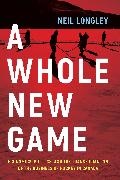Read more
"Hockey used to be Canada's game. What happened? A renowned sports expert details the sellout of a sport Canada once dominated to big-money U.S. corporatization and enumerates the effects, including declining amateur participation and audience size. Hockey is still Canada's most popular spectator sport. Yet, many fans question how organized hockey serves the country of its origin as they watch the NHL expand ever deeper into an indifferent American south, taking the best young Canadian talent and leaving major Canadian markets in Qéubec, the Maritimes and the Prairies in the cold. Minor hockey, once the pride of smaller communities, now serves as a brutal corporate feeder system for the NHL, treating underpaid teenagers like chattel, often shipping players as young as fourteen far away from their homes and families on short notice. Neil Longley contrasts the current state of the game with the way it was before the expansion era, when hockey teams were nurtured and supported at the community level, a system still practiced in much of Europe. In one of the most perceptive and authoritative analyses yet written on modern hockey history, Professor Longley finds no magic formula for putting heart and local pride back in Canada's game, but makes a strong case for placing today's corporate system 'in a more realistic, less-Disneyfied, less sanitized, context.'"--
About the author
Neil Longley, Professor Emeritus in the Isenberg School of Management at the University of Massachusetts Amherst, holds a PhD in Economics from Washington State University and is currently the Director of Business at Nevada State University in Greater Las Vegas. In addition to publishing widely in the field of sports economics, he was the recipient of the 2010-2011 Outstanding Research Award for the Isenberg School of Management. He lives in Las Vegas, NV.
Summary
Hockey used to be Canada’s game. What happened? A renowned sports expert details the sellout of a sport Canada once dominated to big-money U.S. corporatization and enumerates the effects, including declining amateur participation and audience size.
Hockey is still Canada’s most popular spectator sport. Yet, many fans question how organized hockey serves the country of its origin as they watch the NHL expand ever deeper into an indifferent American south, taking the best young Canadian talent and leaving major Canadian markets in Québec, the Maritimes and the Prairies in the cold. Minor hockey, once the pride of smaller communities, now serves as a brutal corporate feeder system for the NHL, treating underpaid teenagers like chattel, often shipping players as young as fourteen far away from their homes and families on short notice. Neil Longley contrasts the current state of the game with the way it was before the expansion era, when hockey teams were nurtured and supported at the community level, a system still practiced in much of Europe. In one of the most perceptive and authoritative analyses yet written on modern hockey history, Professor Longley finds no magic formula for putting heart and local pride back in Canada’s game, but makes a strong case for placing today’s corporate system “in a more realistic, less-Disneyfied, less sanitized, context.”

